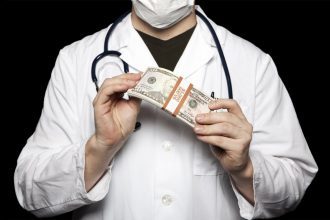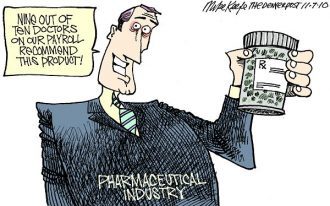CAPITALISM AT ITS WORST: 5 DEADLY SINS OF BIG PHARMA
7
By Paul Buchheit COMMONDREAMS.ORG
Guest writer for Wake Up World
For Mylan Pharmaceuticals, it was a perfect plan — diabolical, unstoppable. The company made changes in its anti-allergy EpiPen dispenser in 2009, enough to give it patent protection. Then, in 2012, it began to give away free pens to schools, gradually making school nurses at least partly dependent on them. Meanwhile the company was successfully lobbying for the “Emergency Epinephrine Act”, commonly referred to as the “EpiPen Law“, which encouraged the presence of epinephrine dispensers in schools. Then, most recently, after raising the price from $100 to $600, Mylan announced a half-price coupon, making itself appear generous — even though the price had effectively jumped from $100 to $300.
This is capitalism at its worst, a greedy and disdainful profit-over-people system that leaves millions of Americans sick — or dead. This is just one of the sins of the pharmaceutical industry…
1. Gouging Customers
The Mylan story is just one of many.
A 12-week course of Sovaldi, a treatment prescribed for hepatitis, costs Gilead Sciences about $84 to produce, and is priced at $84,000.
An American with cancer will face bills of up to $183,000 per year, even though it hasn’t been established that the expensive treatments actually extend lives. (See: The Truth About Chemotherapy – History, Effects and Natural Alternatives.)
Big Pharma is an industry that can suddenly impose a 60,000% increase on desperately ill people. Yet the pharmaceutical industry’s profit margin is matched only by the unscrupulous financial industry for the highest corporate profit margin.
2. Disposing of People Who Can’t Afford Medication
A Forbes writer summarizes:
“Somewhere, right now, a cash-strapped parent or budget-limited patient with a severe allergy will skip acquiring an EpiPen. And someday, they will need it in a life-threatening situation… and they won’t have it. And they will die.”
A recent Health Affairs study concluded that, since 2004, our medical dollars have been “increasingly concentrated on the wealthy.” As a result the richest 1% of American males live nearly 15 years longer than the poorest 1%; the difference in life expectancy is 10 years for women. The high cost of medication is one of the factors leading to early death.
3. Gouging Us a Second Time
We’re paying twice for outrageously overpriced medications, both directly and with our tax dollars. The average medical insurance deductible has increased 67 percent since 2010, and most Medicare patients still face out-of-pocket costs of $7,000 or more a year.
Over $5 billion of our tax dollars was spent by Medicare and Medicaid in 2014 on just two drugs: Sovaldi and Harvoni. Pharmaceutical lobbyists have rigged the system to prevent Medicare from negotiating for lower drug prices.
Not satisfied with Medicare-related abuses, Purdue Pharmaceuticals began targeting troubled post-9/11 miltary veterans with expensive and addicting opioid medications, and within ten years, a third of the Army’s soldiers were hooked on prescription drugs.
4. Stealing Our Research
The pharmaceutical industry receives most of its basic research funding from the taxpayers, and 75 percent of the most innovative drugs were initially funded by the National Institutes of Health.
Dean Baker, macroeconomist and co-director of the Center for Economic and Policy Research, notes that the U.S. is unique in giving drug companies patent monopolies on drugs that are essential for people’s health and lives. An example is genetically engineered insulin which, due to patent protection, cannot be made generically, and as a result can cost a patient up to $5,000 a year — many times more than a patent-expired version. Another example is the anti-parasite drug Daraprim, which has been on the market for 62 years, yet was appropriated by the now-infamous Martin Shkreli and price-hiked from $13.50 to $750.00.
A common excuse for pharmaceutical greed is the cost of research and development. But the industry spends almost $20 on marketing for every dollar spent on R&D. Meanwhile, Big Pharma has cut nearly 150,000 jobs since 2008 — mostly in R&D.
5. Cheating on Taxes
Three of the world’s largest pharmaceutical companies, with over $20 billion in combined profits last year, claimed nearly $9 billion in U.S. losses despite having nearly half their sales in the United States. (Clearly something doesn’t add up here.)
Other major drug companies use the notorious inversion procedure to skip out on taxes. AbbVie has done it. Pfizer tried. And Mylan, along with all its other transgressions, ditched the U.S. for the Netherlands, despite having its employees and facilities in West Virginia.
“… the company withdrew its United States corporation and re-incorporated in the Netherlands, even while its physical plant, all its employees and executives, stayed in West Virginia. That saved the company paying its corporate tax rate of somewhere between 16 and 23 percent, even while it still takes full advantage of its location in the United States and all the infrastructure the country puts around it…”
Adding a further touch of hypocrisy, Mylan even sought the protection of the U.S. government’s Federal Trade Commission when another company attempted a hostile takeover.
Patriotism is a beautiful thing to corporations when it protects their profits.
Recommended reading by Paul Buchheit:
- Overwhelming Evidence that a ‘Guaranteed Basic Income’ Will Work
- The Real Terrorists: The 0.01%
- 5 Signs of a Dying Society
- Why Do So Many Americans Defend the Failed Capitalist Experiment?
- Five Great American Hypocrisies
About the author:
 Paul Buchheit is a college teacher, an active member of US Uncut Chicago, founder and developer of social justice and educational websites (including www.youdeservefacts.org), and the editor and main author of “American Wars: Illusions and Realities” (Clarity Press). He can be reached at paul@UsAgainstGreed.org.
Paul Buchheit is a college teacher, an active member of US Uncut Chicago, founder and developer of social justice and educational websites (including www.youdeservefacts.org), and the editor and main author of “American Wars: Illusions and Realities” (Clarity Press). He can be reached at paul@UsAgainstGreed.org.
This work first appeared on www.commondreams.org and is licensed under a Creative Commons Attribution-Share Alike 3.0 License.









Follow Us!